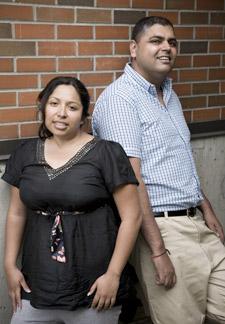Alex Sangha wants to see a day when all queer people can feel safe and secure about their sexuality and their culture. But as a queer person who comes from a South Asian culture, it’s not always easy being out, he says.
“Sexuality and gender issues are not discussed in our community,” explains Sangha. “Queer youth are very isolated and fearful.”
A year ago, the social worker and masters student started a group called Sher Vancouver, a gay social and support group for South Asian people and their friends, families and allies.
“It’s very difficult to come out, get information and resources. We provide peer support, information, and referrals,” he says.
Sangha often gets calls from families who feel they can relate more easily to another South Asian person who understands the culture.
“They’re afraid they might be labelled or it won’t be confidential or the community might find out they might be gay.”
Sangha says he likes supporting people on an individual basis. But more needed to be done.
So now he, along with Sher’s youth outreach worker Ashley Wolfe, are broadening the discussion and addressing homophobia directly through a new series of school workshops they’re calling the Dosti Project.
Dosti means “friendship” in many South Asian languages. “We decided,” says Sangha, “it would be a positive title for the project to empower people and create a positive space.”
Based on the model created by Out in Schools, the idea behind the Dosti Project is to have at least one South Asian person go along with others into classes to talk about coming out.
The workshops begin by depicting coming out scenarios, then open the floor to students so they can talk about their feelings if they or someone they know is queer.
Sangha then tells his coming out story as a gay South Asian.
“It’s an important time of forming your identity,” says Wolfe, who is straight but knows what it’s like to be part of a cultural minority. “Youth need empowerment and support. They just need a friend to talk to. Coming from a counselling background, I know they struggle.”
“Also,” Sangha chimes in, “I want her [Wolfe] to speak from a straight perspective as well because the majority of our audience is going to be straight.”
In the workshops, they talk about stereotypes like “all gay men are stylish” or “all lesbians are butchy” and they explain the implications of saying “that’s so gay” about something that really isn’t gay at all.
The workshops are geared towards challenging the students to be aware of how they make people feel like outsiders with a lot of the terminology they use.
The idea is to put it all on the table and talk about what those words mean to people.
“There’s a certain element of fear that you’re going to be bullied or tormented in your own group,” says Wolfe. “We can clear the misconceptions, answer the difficult questions and then there shouldn’t be so much fear.”
Sangha has already made one presentation at Van Tech Secondary School, but the real prize for him is Surrey schools where the South Asian population is as much as 25 percent.
With Surrey’s history of banning gay-friendly books in the past, Sangha was a little worried the board would not accept his group. But he says the district’s associate manager of safe schools, Rob Rae, has been very open to it.
“That [the Dosti Project] is something we would look at,” says Rae. “We’re going through the process of seeing how we could work with one another and if it’s a possibility.”
Rae is quick to point out that several Surrey high schools now have gay-straight alliances and thinks the Dosti Project would work well with one of those programs.
But with the school year quickly coming to an end, Sangha is looking towards the fall for a launch south of the Fraser.
The Dosti workshops were designed with feedback from BC’s first gay-straight alliance founder Romi Chandra, James Chamberlain of the BC Teachers’ Federation, and Steve Mulligan of the Vancouver School Board.
The project is funded by the CORSA (South Asian) Foundation, the Gay and Lesbian Educators of BC, and the Ministry of Public Safety and Solicitor General (Victim Services and Crime Prevention Division).
With plans to bring the Dosti Project into schools across the Lower Mainland well underway, Sangha is hoping more people will help volunteer. “If they want to volunteer,” says Sangha, “they can email me. They can talk to their teacher or principal to get a presentation in their school.”

 Why you can trust Xtra
Why you can trust Xtra


